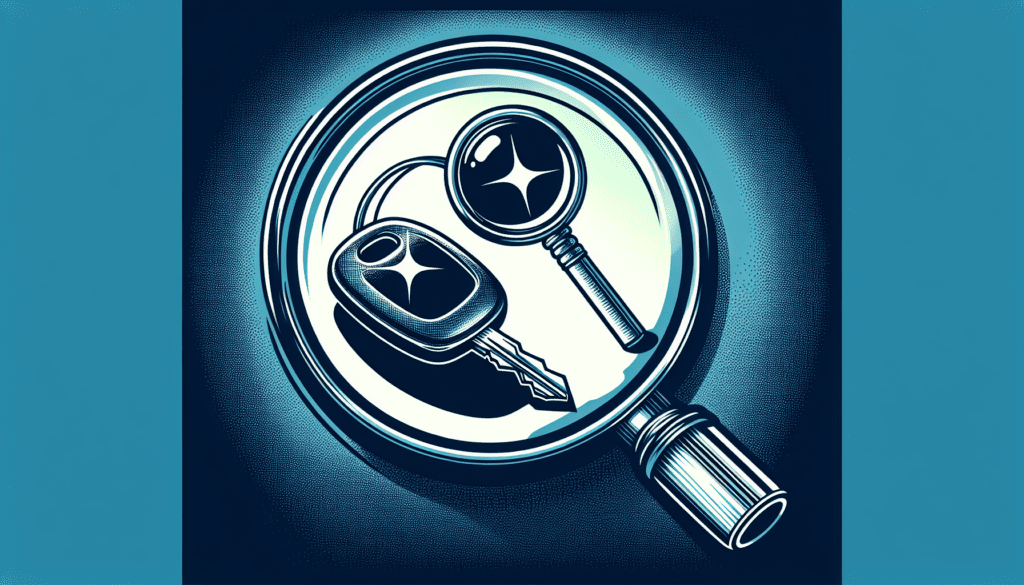So, you’ve decided to take the plunge and buy a used car. It’s an exciting prospect, but also a daunting one. After all, you want to make sure you’re getting a reliable vehicle with a clean title and no hidden accidents. But how do you go about determining if a used car meets these criteria? Well, fear not, because in this article, we’re going to guide you through the process, step by step. From checking the vehicle’s history report to inspecting for any tell-tale signs, you’ll soon be equipped with the knowledge and tools to confidently make your purchase. So, let’s get started on your quest for the perfect used car!
Check the Vehicle History Report
Ordering a vehicle history report should be your first step when considering purchasing a used car. This report provides valuable information about the vehicle’s past, including any title or accident history. It is easy to obtain a vehicle history report online from reputable sources such as Carfax or AutoCheck. By providing the vehicle’s identification number (VIN), you can access a comprehensive report that details the car’s entire history.
When reviewing the report, pay close attention to any title or accident history. Look for any red flags that may indicate previous damage or salvage. A clean title indicates that the car has not been involved in any severe accidents or had major repairs. If the vehicle has a salvage or rebuilt title, this means it has suffered significant damage and has been repaired. While salvage or rebuilt titles are not necessarily deal-breakers, they may affect the car’s value and long-term reliability.
Another important aspect to consider in the vehicle history report is the mileage history. Make sure the mileage listed in the report aligns with what the seller is claiming. Inconsistencies in mileage could be a sign of tampering or odometer fraud, which is illegal and should raise concerns about the vehicle’s overall condition.
Lastly, verify the service and maintenance records included in the report. Regular maintenance is crucial for the longevity and performance of a car. Having a thorough understanding of the car’s maintenance history can give you peace of mind and help you anticipate any potential future issues.
Inspect the Physical Condition of the Car
While the vehicle history report can provide valuable information, it’s essential to physically inspect the car yourself. By examining the car’s physical condition, you can look for signs of prior accidents, identify any areas that may have undergone repairs, and evaluate the overall quality of the vehicle.
Start by looking for signs of accident repairs. Check for uneven panel gaps, misaligned body parts, or any signs of recent paintwork. These can be indications that the car has been involved in an accident and has received repairs. Ideally, you want a car that has had limited or no accident history.
Examine the paintwork carefully. Look for any scratches, dents, or areas where the paint may be peeling or bubbling. These could be signs of previous damage or poor repair work. Additionally, check for any mismatched panels, as this could signify that the car has been assembled using parts from different vehicles.
Don’t forget to inspect the undercarriage of the car. Rust, leakage, or any visible damage in the undercarriage may indicate neglect or poor maintenance. Similarly, pay attention to the condition of the interior. Look for stains, tears, or excessive wear and tear. While minor cosmetic issues can be expected in a used car, significant damage or neglect may be cause for concern.
Get a Pre-Purchase Inspection
No matter how knowledgeable you are about cars, it’s always a good idea to get a pre-purchase inspection from a reputable mechanic. They can identify any hidden issues that may not be visible during your own inspection. Finding a reputable mechanic is crucial, as they will provide an unbiased assessment of the car’s condition.
Schedule a thorough inspection that covers both the exterior and interior of the vehicle. The mechanic should check for any structural damage, such as frame or chassis issues, which can greatly impact the safety and longevity of the car. They should also inspect the mechanical components, including the engine, brakes, suspension, and electrical systems. A comprehensive inspection will give you peace of mind and ensure that you are aware of any potential mechanical or safety issues before making a purchase.
Verify the Title Documents
Before finalizing the purchase of a used car, it is crucial to verify the title documents. This step ensures that the car has a legal and clean title, free from any liens or loans. It’s important to carefully examine the title document to confirm its authenticity and accuracy.
Check for any liens or loans against the vehicle. Liens indicate that the seller still owes money on the car, and this debt could become your responsibility if you proceed with the purchase. Request the seller to provide documentation that proves the lien has been satisfied or cleared.
Ensure that the vehicle identification number (VIN) on the title document matches the VIN on the car itself. Mismatched VINs could be a sign of fraudulent activity or that the vehicle has undergone significant repairs.
Review the previous owner information on the title document. Knowing how many owners the car has had can give you an idea of how well it has been maintained. Multiple owners within a short period could suggest potential issues.
Lastly, be on the lookout for any suspicious alterations or modifications to the title document. Look for signs of erasure, incorrect information, or any attempts to conceal the true history of the car.

This image is property of pixabay.com.
Contact the Previous Owner
If possible, it can be beneficial to contact the previous owner of the car. They may be able to provide you with additional information about the car’s history, including any accidents or claims. By speaking directly with the previous owner, you can gain insight into the car’s maintenance and repair history, helping you make a more informed decision.
Request the previous owner’s contact details from the seller, who should be willing to provide this information if they have nothing to hide. Once you have their contact information, reach out to them and ask specific questions about the car. Inquire about any accidents or insurance claims they made during their ownership. Ask about their maintenance and repair practices to get a better understanding of how the car has been cared for. Additionally, confirm the reason for selling the vehicle as their answer might reveal potential issues they’re not disclosing.
If possible, ask the previous owner to provide any additional documentation they may have, such as service records or repair receipts. This documentation can offer valuable insights into the car’s maintenance history and can help you assess its overall condition.
Consider a VIN Check
As an additional layer of protection, consider performing a VIN check online. Several websites and services provide comprehensive reports based on the vehicle’s VIN, giving you further insight into its history and potential issues.
Performing a VIN check allows you to check for any reported accidents that may not be included in the vehicle history report you initially obtained. It can also verify the title history, ensuring that the car has not been reported as stolen or salvaged. Additionally, a VIN check may highlight any open recalls on the vehicle, informing you of any safety-related issues that need to be addressed.
When conducting a VIN check, ensure that you use a reputable online service. Be cautious about websites that promise free reports but end up asking for payment or personal information. It’s worth investing in a reliable VIN check to gather as much information as possible about the car’s background.

This image is property of pixabay.com.
Consult a Trusted Mechanic or Inspection Service
To ensure a thorough evaluation of a used car, consider consulting a trusted mechanic or inspection service. Seeking recommendations from friends, family, or automobile enthusiasts can help you find a reliable professional who can assess the vehicle’s condition.
Do your research and choose a mechanic or inspection service with a good reputation. Look for reviews or ask for referrals to ensure you are entrusting your potential purchase to a knowledgeable and trustworthy expert.
Before the inspection, discuss your requirements with the mechanic or inspection service. Provide them with a checklist of items you want them to evaluate during the inspection. This can include areas such as the engine, transmission, brakes, suspension, and the overall structural integrity of the car.
After the inspection, request a detailed report that highlights any issues or concerns identified during the inspection. The report should provide a clear understanding of the car’s condition, enabling you to make an informed decision about whether or not to proceed with the purchase.
Check Online Listings and Records
In addition to the vehicle history report and other inspections, it’s a good idea to check online listings and records for the car you are considering. By conducting a thorough search, you can gather additional information about the vehicle’s history and condition.
Search for the vehicle’s history online using its VIN or license plate number. Pay attention to any reported accidents or damage that may have occurred during the car’s previous ownership. This information can help you assess the extent of the damage and evaluate the car’s overall reliability.
Look for any title branding information, such as “flood-damaged” or “salvage.” These designations can affect the car’s value and long-term reliability. Additionally, review the vehicle’s maintenance records if available. Regularly serviced cars tend to have fewer issues and better longevity.
To ensure accuracy, it’s recommended to compare information from multiple sources. This can help identify any inconsistencies or discrepancies that may indicate potential issues or fraudulent activity.

Consider a Certified Pre-Owned (CPO) Car
If you’re seeking added assurance and peace of mind, consider purchasing a certified pre-owned (CPO) car. CPO vehicles are typically sold by authorized dealerships and undergo a thorough inspection process to ensure their quality and reliability.
Understanding the benefits of a CPO car is essential before making a decision. CPO vehicles often come with extended warranty coverage, giving you added protection against unexpected repairs. These vehicles undergo a rigorous inspection that covers both mechanical components and cosmetic appearance. Any necessary repairs or maintenance are completed before the car is offered for sale.
Research certified pre-owned programs offered by different manufacturers and dealerships. Each program may have its own set of requirements and benefits. Verify the inspection process to ensure it meets the standards you expect. Additionally, review the warranty coverage, including any limitations or exclusions.
When considering a CPO car, make sure the certification is genuine. Confirm with the dealer that the car has undergone the necessary inspections and has the proper certification documentation. A genuine CPO car can offer peace of mind and increased confidence in your purchase.
Be Cautious of Private Sellers
While purchasing a used car from a private seller can sometimes offer advantages such as lower prices, it’s important to exercise caution. Private sellers may not always disclose or provide accurate information about the car’s history or condition. To protect yourself, be mindful of these considerations when dealing with private sellers.
Beware of suspiciously low prices. If a deal seems too good to be true, it likely is. Sellers offering significantly lower prices than the market value may be hiding important information or trying to offload a problematic vehicle. Do thorough research on the car’s value to determine if the price is reasonable.
Check for any reluctance from the seller to provide information. If they are evasive or hesitant to answer your questions, it may be a sign that they are withholding crucial details about the car’s history or condition. Don’t be afraid to ask for specific vehicle history or maintenance records to support their claims.
Request a thorough vehicle history. While obtaining a vehicle history report is essential, make sure to also ask for any additional documentation the seller may have. This can include service records, receipts for repairs or maintenance, and any other relevant documentation that can shed light on the car’s past.
Consider getting a professional inspection. Even if the private seller claims the car is in excellent condition, it’s still wise to have an independent mechanic inspect the vehicle. This can help identify any hidden issues that may not be apparent during your own inspection.
To protect yourself and your investment, consider using an escrow service when completing the transaction. Escrow services can hold the funds until both parties fulfill their obligations, ensuring a more secure and transparent transaction.
By following these steps and conducting thorough research, you can increase your chances of purchasing a used car with a clean title and no hidden accidents. Remember, taking your time and being diligent in your evaluation will help you make an informed decision that you can feel confident about. Happy car shopping!


